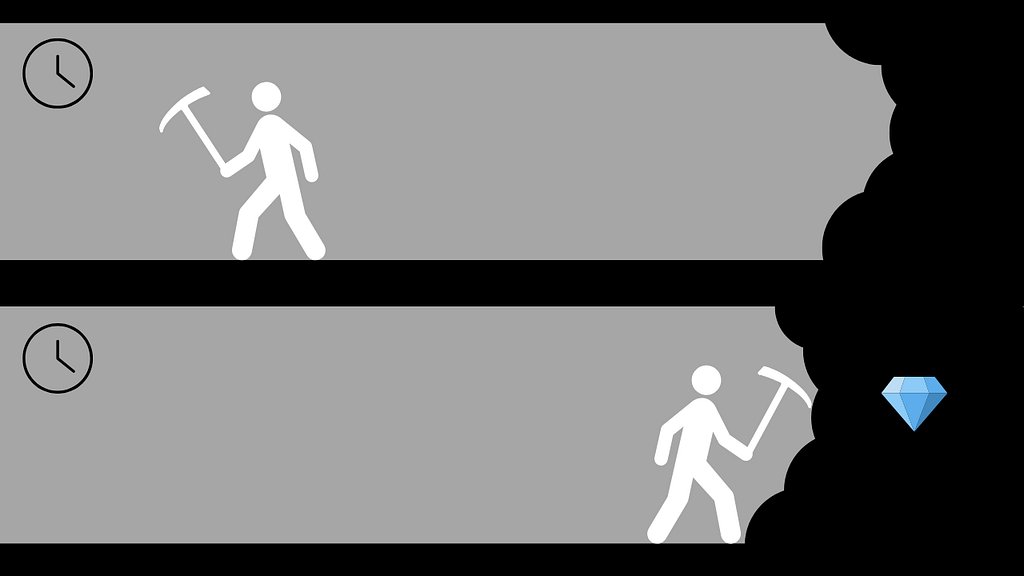What is complacency and how does it manifest within work, school, and relationships? More importantly, what are the potential dangers of complacency, and what signs reveal our complacency?
Imagine this: two miners begin their shift early in the morning, preparing for an 8-hour day underground. As the hours pass, the first miner believes there’s no value, becomes comfortable with his poor effort, and eagerly watches the clock as his shift nears its end. The second miner, however, pays little attention to the time. He keeps working steadily, driven by optimism and ambition, making the idea of quitting seem unpleasant to him.

The first miner’s lack of success stemmed from his growing complacency. By settling for the bare minimum and working below his potential, he limited his outcomes and achieved subpar results. In contrast, the second miner worked diligently and kept working not because of time, but because he wanted to. As a result, he reaped the ultimate reward of his hard work.
We reap what we sow; our efforts and actions directly determine the rewards we receive. If we’re putting in minimal effort yet expecting significant results, there’s something we must change. This change begins with improving our work habits and consistency but, more importantly, transforming our mindset.
By recognizing complacency, understanding the dangers, and identifying its warning signs, we can shift our outlook to bring us further past our original endpoint.
What is complacency?
Confidence is the key to success, but too much of it can backfire. When confidence turns into overconfidence, it can lead to complacency. You start getting too comfortable, kicking your feet up and relaxing, when you’re still miles from the finish line.
On a line spectrum, we can identify three main points: unconfident, confident, and overly-confident/complacent. While lacking confidence can be detrimental, so is having too much of it. The goal is to find that sweet spot where we’re perfectly within the equilibrium point.

As it turns out, our tendency to get too comfortable is due to our poor ability to judge success. “Psychological research suggests that we’re not very good at evaluating ourselves accurately. In fact, frequently overestimate our own abilities,” according to Addison Anderson from Vox.
Merriam-Webster defines complacency as “self-satisfaction, especially when accompanied by unawareness of actual dangers or deficiencies.” While this definition is sufficient, we can better define complacency by diving more in-depth. We can redefine complacency as the human ego, consistently reassuring us that we’re competent enough, even though it may be false. It deceives us into a feeling of false confidence that stunts growth and rejects the need to learn and adapt.
The Dangers of Becoming Complacent
Just like keeping too much money in a checking account can make you miss out on high-interest investment opportunities, having too much confidence can have a similar effect. It compels you to reject growth and learning, causing you to miss out on opportunities to become a better you.
Adopting a complacent mindset changes how we perceive ourselves and how others view us. Complacency deceives us into a false sense of victory and comfort—we believe we’re competent enough, so there’s no need to continue engaging in hard work. While it may bring temporary comfort, this comfort often comes at a high cost—impacting our relationships, careers, and personal goals. Here’s how complacency can have detrimental impacts on your life.
1. Decrease in motivation
A lack of motivation can be the cause, but it can also be the byproduct of complacency. Tackling day-to-day responsibilities and performing your best at school or work becomes twice as difficult when motivation is non-existent. Additionally, when you’re complacent, you believe you’re competent enough already, reducing your desire to work even harder.
Not only does this lack of motivation negatively impact you, but it also impacts the people around you. Your boss, teacher, or teacher may become disappointed when begin noticing your diminishing your effort.

A complacent attitude drains your motivation and work ethic, causing you to settle for performing at the bare minimum. Over time, this minimal effort can become a habit that leaks into other areas of life. If you do the bare minimum at school, that work effort can manifest at work and other personal endeavors.
Doing the bare minimum may be sustainable, but it won’t take you where you want to go. Take Kobe Bryant, for example—he didn’t settle for what was asked of him. Instead, he went above and beyond, surpassing the expectations he and others had on himself. The extra hours he poured onto the court paid off by transforming him into one of the greatest NBA players of all time.
2. Negatively impacts relationships
If there’s one type of person people tend to dislike, it’s those who are cocky and self-centered. Instead of being attracted to them, people often avoid and distance themselves from them. There’s a reason for this—human nature is inherently competitive and comparative. Therefore, find it irritating when others boast about being better than us. It taps into our instinct to measure ourselves against others, and that constant comparison can lead to resentment.

There’s a correlation between complacency and arrogance. The more complacent you are, the more arrogant you become, and vice versa. Our arrogance and complacency stem from a lack of self-awareness and entitlement. It then causes us to assume we’re better than everyone else. As a result, our relationship with friends, spouses, and family suffers due to our self-centered, dismissive, and selfish behavior.
3. Leads to stagnation
We’ve all heard the saying, “Everything that goes up must come down.” If you fired a gun into the air, the bullet would reach its peak, make a 180° turn, and fall back down. This principle can be applied to our complacency in life.

Complacency fuels the fear of failure, preventing us from taking action and leading to stagnation. When we become complacent, we convince ourselves that we’re already good enough, so there’s no need to keep putting in effort. This mindset can create a fear of failure, as we become afraid of losing the sense of competence or success we once had.
If we remain complacent, we immediately stop moving upward and become stagnant. Over time, this stagnation can lead to a decline, like the bullet falling after reaching its peak. Complacency, therefore, can be disastrous, as the goals and success we’ve envisioned for so long become out of reach. This outcome is due to our inactivity in the effort to learn, grow, and improve.
4. Lengthens the duration of success
The road toward success is long and difficult, but if we zoom in rather than out, that road becomes easier to navigate. Achieving success—whether in school, work, or personal goals—isn’t about miracles or luck; it’s about consistent, small actions that compound over time. For example, to be a successful NFL star, you won’t wake up one day and win seven Super Bowls. Instead, your success is built on the small daily habits and actions that develop your character, skillset, and discipline.

One of the biggest obstacles preventing us from taking these small incremental steps isn’t just laziness or lack of motivation. Instead, it’s the comfort that breeds complacency. Comfort convinces you that you’ve already succeeded, so there’s no need to continue investing valuable time and energy into these small, impactful actions. This mindset is a silent killer of progress, slowing your growth and stretching out the time it takes to achieve your goals.
5. Causes you to miss out on life-changing opportunities
Complacency can cloud our focus and cause us to miss monumental growth and learning opportunities. When we’re complacent, our ego deceives us into believing there’s to seize these opportunities. This false illusion keeps us stagnant, preventing us from growing and expanding our knowledge.

By refusing to take advantage of the meaningful opportunities presented to us, we refuse the need to learn, grow, and improve. As a result, our complacency keeps us stuck in mediocrity, as we’ll no longer be experiencing the change necessary to propel us toward success. Our goals drift further out of reach because, without learning and growing, it’s like trying to reach a destination without fueling the car—progress becomes impossible.
6. Puts you in physical danger
“If your ego starts out, ‘I am important, I am big, I am special,’ you’re in for some disappointments when you look around at what we’ve discovered about the universe. No, you’re not big. No, you’re not. You’re small in time and in space. And you have this frail vessel called the human body that’s limited on Earth.”
– Neil deGrasse Tyson
Having a high ego is like having a friend who constantly peer pressures you into making bad decisions. That friend telling you to take another shot of alcohol is like your ego telling yourself that you’re sufficient enough to even bother putting in any more effort.
Your ego may bring confidence, but this is only unchecked confidence built on false lies, blinding you from hearing what you need to hear. Your ego may tell you how smart and experienced you are when this might not be true at all. As a result, your complacency causes you to become dismissive of others, ignore rules, and lose awareness of your surroundings. This reckless behavior doesn’t just hinder personal growth; it can also create serious risks, endangering yourself and those around you.
For instance, complacency can manifest itself in negative ways within construction. Workers who become overly confident in their experience and abilities may disregard essential safety protocols, believing they’re unnecessary or beneath them. This complacency not only compromises their safety but also endangers their coworkers. Such carelessness can lead to accidents that might otherwise have been preventable, highlighting the physical danger of complacency.
5 Signs That You’re Becoming Complacent
Sometimes, complacency can be linked to someone’s personality trait, making it appear as if that’s naturally who they are. Other times, experiences and beliefs they’ve indoctrinated can develop complacency over time, which brings comfort and resistance to change. Complacency is a trait that’s either shaped by someone’s genetics or the environment that raised them.
We have countless daily thoughts, but how do we know if these thoughts stem from confidence or complacency? The key lies in observing the signs reflected in our actions. Confidence typically leads to proactive behavior, taking on challenges, and striving for growth. On the other hand, complacency manifests in inaction, avoidance of challenges, or a sense of entitlement. We can determine whether we’re embracing confidence or complacency by reflecting on our actions. Here are some signs to help you do so.
1. You deny improvement is possible
Complacency is the byproduct of an obnoxiously high ego. That ego is preventing you from taking accountability to acknowledge and accept your weakness. It causes you to start tolerating your poor work ethic. As a result, you undermine the success you’re striving for, as complacency makes you tolerant of mediocrity instead of pushing for growth and improvement.

As you start tolerating your poor work ethic, you may lose satisfaction in striving for improvement or even reject the need to improve due to complacency. It’s similar to playing a video game; if you become complacent, you stop finding joy in leveling up and may even deny the importance of progress altogether.
Every skill and attribute you possess can be improved. We’re all naturally born imperfect humans, so there is always room for growth, regardless of the type of skill. The moment you convince yourself that improvement is no longer possible is when you begin to accept complacency and stagnation as the norm. A lack of progress or even the desire to progress becomes a red flag, showing that you’re settling for less than what you’re capable of.
2. You’re Becoming More Easily Distracted
We live in the modern era, where everything—technologies, companies, and people—is fighting for our attention. The more we feed into these distractions and reject the need to address them, the more complacent we become. This prevents us from entering a flow state and serves as another indicator that we’re tolerating our poor work ethic.
Indulging in distractions like phone notifications, spam emails, social media, or comparing ourselves to others often signals a lack of motivation. When we no longer find satisfaction in our work, we turn to these meaningless distractions as a temporary escape, hoping they’ll provide a sense of fulfillment. In reality, they only pull us further from our goals and reinforce a cycle of complacency.
Of course, we’re all human, and our brains are designed to maintain focus for so long. However, the difference lies in how complacent and non-complacent individuals handle distractions. A non-complacent person recognizes distractions and takes proactive steps to manage them, staying aligned with their goals. In contrast, a complacent person allows distractions to take over, using them as an excuse to avoid effort, depleting their growth and success.
3. Accomplishing less within larger time frames
As previously stated, complacency encourages poor effort and makes us susceptible to distractions. Our focus diminishes, as a result, ultimately extending the time it takes for us to accomplish tasks and acknowledge our responsibilities.

As complacency sets in, a pattern emerges: the more time we have, the less work we produce within a given time frame. Instead of using our limited time to our advantage, we become slower and less efficient, dragging out tasks that could be completed quickly.
That homework assignment or email your boss requested takes twice as long because complacency fosters procrastination, laziness, and unproductive habits, making it harder to stay focused and get things done.
4. Expecting to Yield Immediate Results
Complacency traps us in a fixed mindset, leading us to believe that growth and improvement are impossible or unnecessary. In her book Mindset, Carol Dweck explains that people with a fixed mindset avoid putting in effort because of their disappointing beliefs.
They think success is about being more naturally gifted than others, that failure defines their worth, and that effort is only for naturally talented people. This mindset discourages growth and perpetuates complacency, keeping them stuck rather than free.

Complacent people’s fixed mindset and refusal to improve encourage them to expect immediate results despite their lack of effort and consistency. They become attached to “get rich quick” schemes over learning and growth opportunities. They begin focusing on the results rather than the vehicle of hard work, consistency, dedication, and effort to get them there. When their results take longer than expected, they become impatient and give up, reinforcing their complacency even more.
5. Not Capitalizing on Learning/Growth Opportunities
A complacent person follows their ego rather than listening to their humble desires for growth and learning. Their ego feeds them thoughts that encourage complacency, such as: “I’m experienced enough to learn more,” “I’ve been doing the same thing for many years,” or “The work I do is already enough.” While these thoughts may contain some truth, there’s never harm in learning more than you currently know.
Instead of striving to grow and improve, complacency convinces you that you’re already good enough and that there’s no need to put in further effort. This mindset is not only limiting but also dangerous. It mirrors what happened to the Mughal Empire in 1857. Their complacency kept them from addressing internal issues, such as economic instability and, a weak military, which ultimately led to their collapse. Like the Mughal Empire, ignoring the need for growth and change can be catastrophic.
Your unwillingness to grow is a clear sign of rising complacency. Overreliance on experience and knowledge can foster overconfidence, blinding you to areas that still need improvement. Every skill or trait can be improved no matter what, and denying this reveals your complacent refusal to improve.
Conclusion
Complacency may appear harmless as we should all strive to reach comfort at some point. However, it’s a dangerous mindset that sinks us further in quicksand. By identifying and acknowledging its risks and warning signs, we can shift our perspective and take proactive steps to avoid it. Ignoring these signs only delays progress, causes us to miss valuable opportunities, and pulls us further into a cycle of stagnation and lost motivation.
Making any mindset shift is challenging because the biggest obstacle is often your ego. The ego comforts you with what you want to hear—that you’re already good or smart enough—even if it’s not entirely true. However, by recognizing the signs and dangers of complacency, you can start changing your entire perspective on life and take steps to climb out of that quicksand of complacency.
How has complacency affected you in your life? How do you know if you’re complacent?


